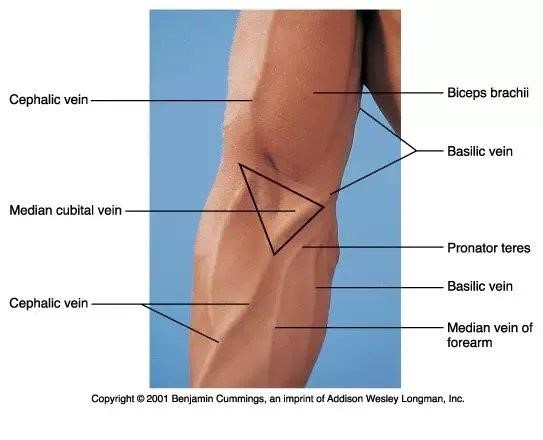A nurse is preparing to obtain a blood specimen from a client by venipuncture. The client is receiving IV fluids through an IV catheter inserted in the basilic vein of the right forearm. Which of the following sites should the nurse plan to use to obtain the blood specimen?
Foot
Left upper arm
Left forearm
Right forearm
The Correct Answer is C
-
-
-
- The foot is not a typical site for obtaining a blood specimen by venipuncture.
- This arm is not ideal for venipuncture because the client is receiving IV fluids through an IV catheter in the basilic vein of the right forearm.
- The left forearm is a suitable site for venipuncture because the client is receiving IV fluids through an IV catheter in the basilic vein of the right forearm.
- The right forearm is not ideal for venipuncture because the client is receiving IV fluids through an IV catheter in the basilic vein of the right forearm.
-
-

Nursing Test Bank
Naxlex Comprehensive Predictor Exams
Related Questions
Correct Answer is C
Explanation
A. Secondary prevention focuses on early detection and intervention to prevent further harm or complications. Tube feeding for a special needs student is not aimed at preventing the initial onset of a condition or injury.
B. Quaternary prevention focuses on avoiding unnecessary medical interventions and reducing the risk of over-medicalization. Tube feeding for a special needs student is a necessary medical intervention.
C. Tertiary prevention focuses on managing and treating existing conditions to prevent further complications or disability. Helping a special needs student with tube feeding is aimed at managing their existing condition (inability to eat orally) to prevent malnutrition or other complications.
D. Primary prevention focuses on preventing the initial onset of a condition or injury. Tube feeding for a special needs student is not aimed at preventing the initial onset of their inability to eat orally.
Correct Answer is ["B","D","E","G"]
Explanation
A. Inserting a nasogastric (NG) tube is not a priority action in the initial management of sepsis.
B. Measuring lactate levels is a priority action in the initial management of sepsis. Elevated lactate levels indicate tissue hypoxia and are associated with increased mortality in septic patients.
C. Obtaining a wound culture is not a priority action in the initial management of sepsis.
D. Administering broad-spectrum antibiotics is a priority action in the initial management of sepsis. Prompt antibiotic therapy is associated with improved outcomes in septic patients.
E. Obtaining blood cultures is a priority action in the initial management of sepsis. Blood cultures help identify the causative organism and guide antibiotic therapy.
F. Type and cross-matching for packed RBCs is not a priority action in the initial management of sepsis.
G. Rapidly administering 30 mL/kg of normal saline is a priority action in the initial management of sepsis. This bolus of fluid helps restore tissue perfusion and hemodynamic stability.
H. Obtaining a urine specimen is not a priority action in the initial management of sepsis.
Whether you are a student looking to ace your exams or a practicing nurse seeking to enhance your expertise , our nursing education contents will empower you with the confidence and competence to make a difference in the lives of patients and become a respected leader in the healthcare field.
Visit Naxlex, invest in your future and unlock endless possibilities with our unparalleled nursing education contents today
Report Wrong Answer on the Current Question
Do you disagree with the answer? If yes, what is your expected answer? Explain.
Kindly be descriptive with the issue you are facing.
